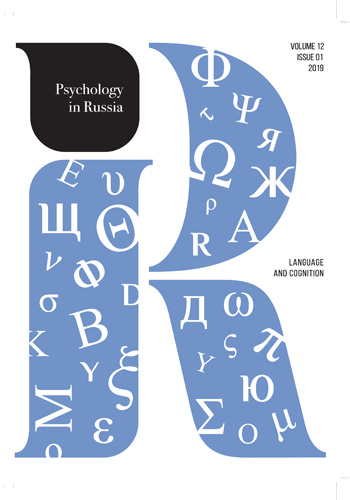Psychology in Russia: State of the Art, Moscow: Russian Psychological Society, Lomonosov Moscow State University, 2019, 1, 200 p.

2019
Volume 12 (01)
Volume 12 (01)
Language and Cognition
Guest editors:
Csaba Pléh (Hungary)
Boris B. Velichkovsky (Russia)
Csaba Pléh (Hungary)
Boris B. Velichkovsky (Russia)
-
Understanding of Active and Passive Constructions in 7- to 10-Year-Old Russian-Speaking Children: Reliance on Inflections or Word OrderPDF HTML4611“ CITE
Akhutina, T.V., Panikratova, Y.R., Korneev, A.A., Matveeva, E.Yu. & Vlasova, R.M. (2019). Understanding of active and passive constructions in 7- to 10-year-old Russian-speaking children: Reliance on inflections or word order. Psychology in Russia: State of the Art, 12(1), 3–20.
copied
-
Developing Secondary Language Identity in the Context of Professional Communication
-
A Four-Dimensional Spherical Model of Interaction Between Color and Emotional Semantics
-
What Are You Tinking About Where? Syntactic Ambiguity between Abstract Arguments and Concrete Adjuncts in Hungarian, Modulated by Concreteness
-
The Relationship of Language and Intelligence Development to the Maturity of the Subcortical Structures in Children with Specific Language Disorders
-
Modeling Personality Structure Using Semantic Relationships: Is the HEXACO Honesty-Humility a Distinct Trait?
-
The Relationship Between Executive Functions and Language Competences in Middle School Children
-
Luria's Approach to the Restoration of Speech in Aphasia and the International Classification of Functioning, Disability and Health (ICFDH)
-
Eye Movements and Word Recognition during Visual Semantic Search: Differences between Expert and Novice Language Learners
-
Comparing the Generation of Words from Different Semantic Categories in Native and Foreign Languages
-
Possible Cognitive Mechanisms for Identifying Visually-presented Sound-Symbolic Words









